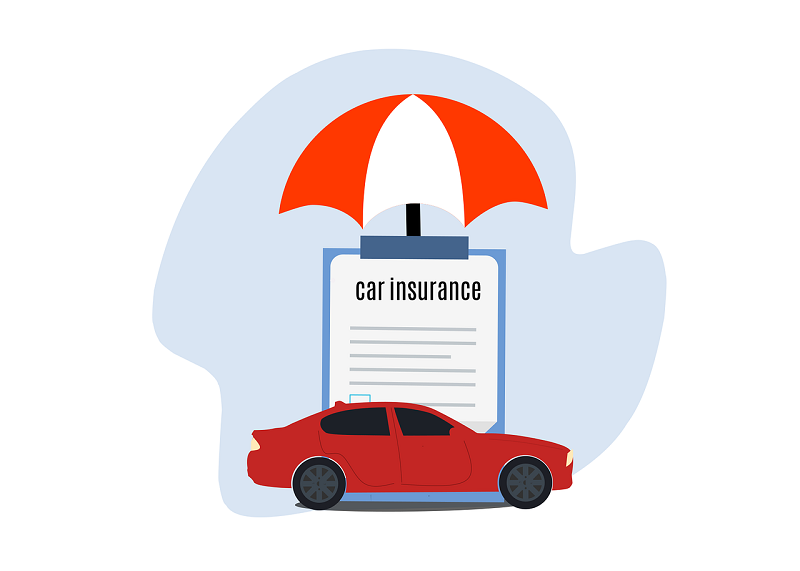When I Rent a Car, Do I Need the Insurance?
Many people don’t think about the need for car insurance when renting a car, but it is important. While the car rental company may have coverage, it is not enough and there are a few things you should know before you rent. In this guide, we will answer the common question, “When I rent a car, do I need insurance?”
We’ll arm you with all the knowledge you require to decide with confidence and have a stress-free rental experience.
Therefore, buckle up, and let’s begin!

What is Car Rental Insurance? Do I Really Need It?
Car rental insurance provides protection and coverage in case of accidents, theft, or damage to a rental vehicle. It acts as a safety net, ensuring you won’t be financially responsible for any unforeseen incidents during the rental period. While car rental insurance is not mandatory, it offers peace of mind and safeguards your finances.
Understanding Car Rental Insurance is crucial when renting a vehicle to avoid unexpected expenses and potential liabilities. This post will shed light on the importance of addressing this topic and provide valuable insights into the various aspects of Car Rental Insurance.
Without the right insurance, you can be liable for the whole worth of the car in repairs or lost usage fees.
Additionally, most personal auto insurance policies do not cover rental cars or provide limited coverage, making it essential to consider additional protection.
Statistics show that a significant number of car accidents involve rental vehicles, emphasizing the need for proper coverage.
Think about a situation where you rent out a car for a weekend trip. While driving, you accidentally ram another vehicle, triggering damages to both cars. You would certainly be responsible for paying the fixing expenditures, which can be in the hundreds of dollars if you really did not have car rental insurance.

Types of Car Rental Insurance Collision Damage Waiver (CDW)
Collision Damage Waiver, or CDW for short, is one of the most common types of car rental insurance. CDW covers the expenses related to damage to the rental car in case of an accident, theft, or vandalism. It helps you relax by lowering your financial responsibility if something goes wrong during the rental period.
However, CDW has some limitations that you should be aware of. For instance, it may not cover damage to the tires, windows, or undercarriage of the car. Also, some rental companies may still charge you a part of the damages, called a deductible. It’s important to read the terms and conditions of CDW carefully.
The price of CDW depends on things like the rental company, location, and the kind of car you rent. It is often shown as a daily rate, which can increase quickly over a long rental period. But, considering the potential costs of fixing or replacing the car, CDW can be a good investment for peace of mind.
Supplemental Liability Insurance (SLI)
Another important type of car rental insurance is Supplemental Liability insurance, or SLI. SLI provides coverage for damages or injuries caused to third parties in an accident involving the rental vehicle. It offers additional liability protection beyond what is included in the basic rental agreement.
SLI is crucial because it protects you from potentially substantial financial liabilities in case of an accident. Without sufficient coverage, you can be left footing the bill for medical costs, property damage, and legal fees, which can rapidly mount up.
The cost of SLI can vary depending on factors such as the rental company and the coverage limits you choose. It is typically presented as an additional daily fee, and while it may increase the overall rental cost, it offers significant protection and peace of mind.
Personal Accident Insurance (PAI)
The purpose of Personal Accident Insurance (PAI), often known as PIP, is to cover medical costs and accidental death or dismemberment in the event that a rental car driver is involved in an accident. PAI is an optional insurance coverage that may be offered by rental companies.
While the coverage provided by PAI can vary, it typically includes medical expenses for the driver and passengers, as well as accidental death and dismemberment benefits. It can offer an extra layer of financial protection in case of injuries sustained during a rental car accident.
The cost of PAI varies depending on factors such as the rental company and the coverage limits. It is important to assess your personal health insurance coverage and consider your specific needs before opting for PAI.
Personal Effects Coverage (PEC)
Personal Effects Coverage, often referred to as PEC, provides protection for personal belongings that are stolen or damaged while inside the rental vehicle. It covers items such as luggage, electronics, and other personal possessions.
PEC can be valuable if you are traveling with valuable items or if you’re concerned about potential theft. However, it’s important to note that PEC may come with limitations, such as exclusions for certain types of items or a maximum coverage limit.
The cost of PEC varies depending on the rental company and the coverage limits you choose. It is often presented as an additional daily fee, and it’s important to assess the value of your personal belongings and the likelihood of them being stolen or damaged before deciding on this coverage.
Benefits of Car Rental Insurance
- Peace of Mind: Car rental insurance offers peace of mind, knowing that you won’t be solely responsible for covering all costs in case of an accident or damage.
- Convenience: In the event of an incident, rental car insurance simplifies the claims process and saves you from dealing with complicated paperwork.
- No Impact on Personal Insurance: By opting for rental car insurance, you won’t have to file a claim with your personal auto insurance provider, avoiding potential premium increases.
Let’s take a humorous break and look at some real-life examples of car rental insurance mishaps:
- The “Reverse” Gear: Imagine renting a car and accidentally putting it in reverse instead of driving, crashing into a wall behind you. Without car rental insurance, you would be responsible for the costly repairs.
- The Parking Lot Prank: While parked in a shopping mall, someone decides to play a practical joke by keying the side of your rental car. Car rental insurance would come to the rescue and cover the damages caused by this mischievous act.
Factors to Consider When Deciding on Car Rental Insurance
Coverage Provided by Personal Auto Insurance
One factor to consider when deciding on car rental insurance is the coverage provided by your personal auto insurance policy. In some cases, your personal auto insurance may extend coverage to rental cars, reducing the need for additional insurance.
However, it’s essential to review the terms and conditions of your policy to understand the extent of coverage provided for rental cars. Some policies may have limitations or exclusions that leave you partially or entirely responsible for damages or liability.
You should also look into other possibilities for rental vehicle insurance if you don’t own a car and don’t have personal auto insurance.
Credit Card Benefits
Many credit cards offer rental car insurance benefits as a perk for cardholders. These benefits can provide additional coverage and potentially eliminate the need for purchasing separate rental car insurance.
Credit card insurance typically covers damage to the rental vehicle and may also include liability coverage. However, it’s crucial to understand the limitations and requirements of credit card insurance.
For example, certain types of vehicles may not be eligible for coverage, and there may be specific conditions you need to meet, such as paying for the rental car with the credit card offering the insurance.
It’s important to review the terms and conditions of your credit card benefits and contact your credit card issuer to understand the extent of coverage provided before relying solely on credit card insurance.
Rental Car Company Policies
Rental car companies often offer their own insurance options, and it’s important to consider their policies when deciding on car rental insurance. Rental car insurance policies can vary significantly between companies, so it’s crucial to carefully read the terms and conditions.
Some rental car companies may require you to provide proof of insurance or make certain coverage decisions at the time of rental. Understanding the specific terms and requirements can help you make an informed decision.
It’s also worth noting that rental car company insurance options may be more expensive compared to other alternatives. Therefore, it’s important to compare the costs and benefits with other insurance options available to you.
Risk Assessment and Personal Preferences
When deciding on car rental insurance, it’s essential to consider your personal risk factors and preferences. Factors such as your driving experience, the location where you’ll be driving, and your comfort level with assuming potential liabilities should be taken into account.
The chance of being involved in a collision may be significantly decreased if you are an experienced driver with a spotless driving record.
On the other side, the probability of unpleasant accidents or mishaps may be increased if you’re renting a car in a foreign country with unexpected driving conditions.
Consider your own comfort level with assuming risks and evaluate how much financial liability you’re willing to take on. It’s important to strike a balance between adequate coverage and avoiding unnecessary expenses.
Let’s take a moment to laugh at some amusing insurance scenarios:
- The Confused Cardholder: Picture this: you use your credit card’s rental car insurance benefit, only to find out later that it doesn’t cover luxury car rentals. You end up paying for damages to the Lamborghini you rented for a special occasion.
- The “Multi-Policy” Mayhem: You assume your homeowners insurance covers personal effects inside a rental car, only to realize that you need to purchase separate coverage for it. As a result, your stolen laptop and camera are not covered, and you’re left empty-handed.
Alternatives to Traditional Car Rental Insurance
Non-Owned Auto Insurance – Do I Need Insurance When Renting a Car?

An alternative to traditional car rental insurance is non-owned auto insurance. When you drive a car that you don’t own, such as a rental car, you are protected by a form of insurance coverage known as non-owned auto insurance.
This type of insurance can be obtained through an insurance provider and is designed to cover the gaps that may exist in your personal auto insurance or other insurance options.
Non-owned auto insurance typically provides liability coverage, protecting you against claims made by third parties in case of an accident. However, it’s important to review the terms and conditions of the policy to understand the extent of coverage provided.
Umbrella Insurance
Umbrella insurance is another alternative that can provide additional liability coverage in various situations, including rental cars. Umbrella insurance acts as an extra layer of protection beyond the coverage limits of your primary insurance policies, such as personal auto insurance.
This type of insurance can offer higher liability limits, which can be beneficial in case of severe accidents or lawsuits. Umbrella insurance is often more comprehensive and covers a wider range of scenarios compared to rental car-specific insurance.
However, umbrella insurance typically requires you to have certain minimum liability limits on your primary insurance policies. It’s important to consult with an insurance professional to understand the requirements and benefits of umbrella insurance for rental cars.
Travel Insurance
In some cases, travel insurance policies may provide coverage for rental cars as part of their comprehensive coverage. Travel insurance is designed to protect you against various risks and unexpected events that may occur during your trip.
Some travel insurance policies include rental car coverage, offering protection for damages, theft, and liability. To comprehend the scope of coverage and any restrictions, it’s necessary to thoroughly read the terms and conditions of the travel insurance policy.
When considering travel insurance for rental cars, it’s crucial to assess the overall value and benefits of the policy beyond just rental car coverage. Other travel-related costs, such as trip cancellation, medical crises, and lost luggage, may be covered by travel insurance.
Rental Car Insurance Myths Debunked
Myth 1: Rental car insurance is always necessary
One common myth about rental car insurance is that it is always necessary. While rental car insurance can provide valuable protection, there are situations where it may not be needed.
For example, if you have comprehensive personal auto insurance that covers rental cars, purchasing additional insurance may be redundant. Similarly, if your credit card offers sufficient rental car insurance benefits, you may not need to purchase separate coverage.
It’s important to evaluate your existing insurance policies and understand the extent of coverage they provide for rental cars. By doing so, you can determine whether additional rental car insurance is necessary based on your specific circumstances.
Myth 2: Credit card insurance covers everything
Another misconception is that credit card insurance covers everything when renting a car. While credit card insurance can offer significant coverage benefits, it’s essential to be aware of its limitations.
Credit card insurance typically covers damage to the rental vehicle, but it may not include liability coverage for damages to third parties or their property. Furthermore, in order to activate the coverage, there can be particular conditions or demands that must be satisfied.
It’s crucial to review the terms and conditions of your credit card insurance benefits and understand the extent of coverage provided. If there are any gaps or limitations, you may need to consider additional insurance options to ensure adequate protection.
Myth 3: Personal auto insurance always covers rental cars
Many people assume that their personal auto insurance automatically covers rental cars. However, this is not always the case, and the coverage provided by personal auto insurance policies can vary.
While some personal auto insurance policies extend coverage to rental cars, others may have limitations or exclusions. For example, your personal auto insurance may not cover certain types of rental vehicles, such as luxury or exotic cars.
It’s crucial to review your personal auto insurance policy and contact your insurance provider to understand the extent of coverage provided for rental cars. By doing so, you can avoid surprises and make informed decisions regarding additional rental car insurance.
Now, let’s lighten the mood with some comical rental insurance tales:
- The “Weather” Woes: You rent a convertible sports car for a beach vacation and, unfortunately, a sudden hailstorm damages the vehicle’s soft top. Without comprehensive insurance coverage, you’d be left counting the dents and the dollars required for repairs.
- The “Dust” Disaster: You take your rental car off-road for an adventurous experience, and it ends up getting covered in dust and mud. Without proper insurance coverage, returning the car in its filthy state might result in a hefty cleaning fee.
Tips for Making Informed Decisions About Rental Car Insurance

Understand Your Existing Coverage
Before renting a car, take the time to review your existing insurance policies. Understand the coverage provided by your personal auto insurance, credit card benefits, and any other relevant insurance policies.
By understanding your existing coverage, you can identify any gaps or limitations that may require additional rental car insurance. This step is crucial in making informed decisions and avoiding unnecessary expenses.
When it comes to insuring your precious possession, such as a Porsche 911 Carrera renting in Dubai, you need coverage that goes above and beyond the ordinary. Ensuring the safety and protection of this high-performance luxury car requires a specialised approach to motor insurance. With its powerful engine and top-notch finishes, the Porsche 911 Carrera requires a policy that understands the unique risks and rewards associated with such a sophisticated vehicle.
Whether you’re driving off-road or navigating city streets, having the right insurance coverage for your Porsche 911 Carrera rental will give you the peace of mind to enjoy an exhilarating driving experience without worrying about unforeseen setbacks. And you can rent the best cars for your trip at Renty.
Read the Terms and Conditions
When considering rental car insurance, carefully read the terms and conditions of the policies. Pay close attention to important clauses, such as coverage limitations, deductibles, and exclusions.
For example, some rental car insurance policies may exclude coverage for certain types of damage or have specific conditions for coverage to apply. Understanding these details can help you assess the value and adequacy of the insurance offered.
Compare Costs and Benefits
Take the time to compare the costs and benefits of different rental car insurance options. Consider factors such as the coverage provided, the cost of insurance, and the likelihood of needing the coverage based on your travel plans.
You may decide more intelligently which insurance policy option offers the best value for your unique needs by weighing costs and advantages.
Consult with Insurance Professionals
If you’re unconvinced regarding the insurance options or have certain queries, do not hesitate to talk to insurance policy specialists. Insurance agents or brokers can provide guidance and help you understand the complexities of rental car insurance.
They can explain the terms and conditions, provide recommendations based on your specific circumstances, and help you navigate the various insurance options available.
Consider Your Travel Plans and Itinerary
When deciding on rental car insurance, consider your travel plans and itinerary. Factors such as the destination, duration of the trip, and driving conditions can impact your insurance needs.
For example, if you’re traveling to a foreign country with unfamiliar driving rules and road conditions, you may want to consider additional insurance for added protection.
Similarly, if you’re renting a car for a short period within a familiar location, you may be comfortable relying on your existing coverage.
By considering your travel plans and itinerary, you can assess the level of risk and determine the appropriate level of insurance coverage needed.
Conclusion
In conclusion, car rental insurance is a vital aspect of renting a car, providing essential coverage and protection. By understanding the types of insurance available, considering personal auto insurance and credit card coverage, and assessing individual needs and risks, renters can make an informed decision about car rental insurance. Taking the time to research insurance options, read and understand policy terms, and make a reservation with the chosen insurance coverage ensures a smooth and worry-free car rental experience.
FAQs: When I Rent a Car, Do I Need the Insurance?
Is rental car insurance mandatory?
No, rental car insurance is not mandatory. Whether you need rental car insurance depends on your existing insurance coverage and personal preferences. It’s important to review your personal auto insurance policy, credit card benefits, and other insurance options before deciding on rental car insurance.
Can I use my personal auto insurance for rental cars?
In some cases, your personal auto insurance may extend coverage to rental cars. However, the coverage provided by personal auto insurance can vary, and certain limitations or exclusions may apply. Review your personal auto insurance policy and contact your insurance provider to understand the extent of coverage for rental cars.
What if I don’t have personal auto insurance?
If you don’t have personal auto insurance, you’ll need to explore alternative options for rental car insurance. Rental car company policies, credit card insurance benefits, non-owned auto insurance, or travel insurance can provide coverage for rental cars. It’s important to evaluate these options and choose the one that best suits your needs.
How much does rental car insurance cost?
The cost of rental car insurance can vary depending on factors such as the rental company, location, type of coverage, and duration of the rental period. It is often presented as a daily rate or an additional fee. It’s important to compare the costs and benefits of different insurance options to make an informed decision.
What should I do if I get into an accident with a rental car?
If you get into an accident with a rental car, take the necessary steps to ensure your safety and the safety of others involved. Contact the rental car company immediately and follow their instructions. Notify your insurance provider and provide them with all the relevant details. It’s important to document the accident, take photographs if possible, and gather information from witnesses. Follow the appropriate procedures to report the incident and initiate the claims process.




Be the first to comment